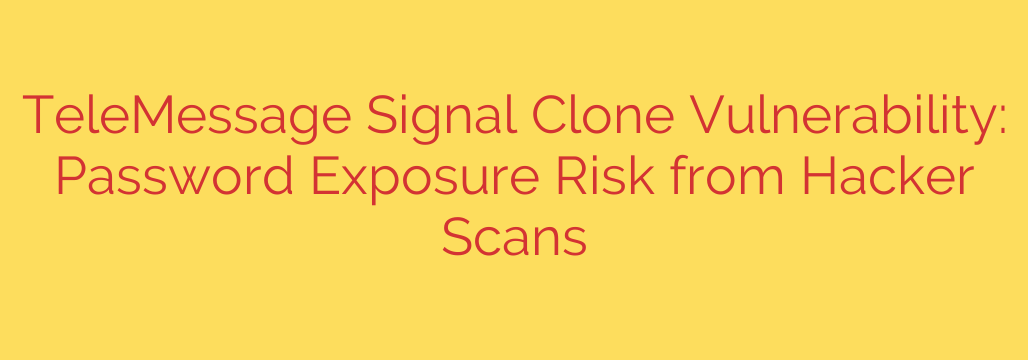
Urgent Security Alert: TeleMessage Flaw Puts User Passwords at Risk
In today’s digital age, the security of our communications is paramount. We rely on messaging apps for everything from personal chats to sensitive corporate discussions. A recently discovered security flaw highlights just how critical it is to be vigilant, revealing a significant vulnerability in an enterprise messaging platform that exposed user passwords to active scanning by hackers.
The issue centers on an enterprise service designed to archive messages from popular platforms like Signal for compliance purposes. A critical misconfiguration within this system created a loophole that malicious actors could exploit, putting sensitive user credentials and private communications in jeopardy.
Understanding the Core Vulnerability
At its heart, the vulnerability was a case of insufficient security on a system endpoint. This allowed unauthorized individuals to systematically scan the service and retrieve user data. The most alarming aspect of this flaw is that it exposed user passwords in plaintext or an easily reversible format.
It is essential to clarify that this is not a vulnerability in the official Signal messaging app itself. The official Signal app remains secure and end-to-end encrypted. The risk originated from a third-party service that integrates with it for corporate compliance and archiving, specifically the TeleMessage platform.
For businesses in regulated industries like finance and healthcare, services that archive communications are necessary to meet legal requirements. However, this incident serves as a stark reminder that any third-party service handling your data must be held to the highest security standards.
The Dangers of Exposed Credentials
When passwords are leaked, the consequences can be severe and far-reaching. Attackers who gain access to these credentials can pose a number of threats:
- Unauthorized Access to Messages: Attackers could potentially log in to user accounts and view archived private and corporate communications, leading to a massive data breach.
- Account Takeover: With a valid password, a hacker could take full control of a user’s account on the platform, locking the legitimate user out.
- Password Reuse Attacks: Many people reuse passwords across multiple services. Hackers know this and will systematically try the leaked password on other popular platforms like email, banking, and social media accounts.
- Corporate Espionage: If the compromised accounts belong to employees discussing sensitive company information, the leak could lead to the theft of intellectual property, financial data, or strategic plans.
Actionable Steps to Protect Your Accounts
Whether you use this specific service or not, this event underscores the importance of proactive security hygiene. If you are concerned that you or your organization may have been affected, or if you simply want to bolster your security posture, follow these critical steps immediately.
Change Your Password Immediately: If you have an account with the affected service, your first priority should be to change your password. Create a new, strong, and unique password that you do not use for any other account.
Enable Multi-Factor Authentication (MFA): MFA is one of the most effective security measures you can take. It requires a second form of verification (like a code from your phone) in addition to your password, making it dramatically harder for attackers to gain access even if they have your password.
Audit Your Password Habits: Stop reusing passwords. Every online account should have its own unique password. Using a reputable password manager can help you generate and store complex passwords securely without needing to memorize them all.
Review Account Activity: Regularly check the login history and activity logs for your important accounts. Look for any suspicious logins from unrecognized locations or devices and report them immediately.
For Business Administrators: If your organization uses any third-party message archiving service, it is crucial to review its security protocols. Contact the vendor to confirm that your data is secure and that all necessary patches and configurations have been applied.
This vulnerability is a critical reminder that security is a shared responsibility. While we trust service providers to protect our data, we must also take personal steps to secure our digital lives. By adopting strong passwords, enabling MFA, and remaining vigilant, you can significantly reduce your risk of becoming a victim.
Source: https://www.bleepingcomputer.com/news/security/hackers-scanning-for-telemessage-signal-clone-flaw-exposing-passwords/








